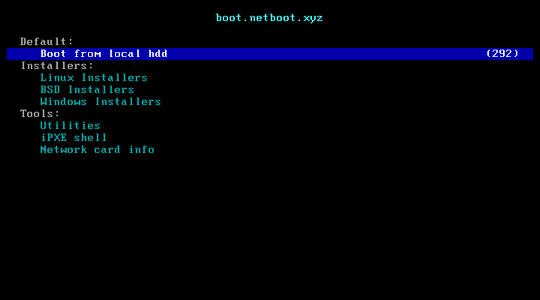# reinstall
[](https://app.codacy.com/gh/bin456789/reinstall/dashboard)
[](https://www.codefactor.io/repository/github/bin456789/reinstall)
[](https://github.com/aschey/vercel-tokei)
One-Click Script to Reinstall System [中文](README.md)
## Highlights
- Supports installation of 17 common Linux distributions
- Supports installation of official Windows ISO, automatically finds ISO links, and integrates virtual machine drivers
- Supports installation in any direction, i.e., `Linux to Linux`, `Linux to Windows`, `Windows to Windows`, `Windows to Linux`
- No need to input IP parameters; automatically recognizes dynamic and static IPs, supports `/32`, `/128`, `gateway outside subnet`, `IPv6 only`, `dual NIC` and other special network configurations
- Specially optimized for low-spec servers, requires less memory than the official netboot
- Uses partition table ID to identify hard drives throughout the process, ensuring no wrong disk is written
- Supports BIOS and EFI boot, and ARM architecture
- No homemades image included, all resources are obtained in real-time from source sites
- Includes many comments.
## System Requirements
| Target System | Version | Memory | Disk |
| ---------------------------------------------------------------------------------------------------------------------------------------------------------------------------------------------------------------------------------------------------------- | ------------------------------------- | --------- | ---------------------- |
|  Alpine | 3.17, 3.18, 3.19, 3.20 | 256 MB | 1 GB |
|
Alpine | 3.17, 3.18, 3.19, 3.20 | 256 MB | 1 GB |
|  Debian | 9, 10, 11, 12 | 256 MB | 1 ~ 1.5 GB ^ |
|
Debian | 9, 10, 11, 12 | 256 MB | 1 ~ 1.5 GB ^ |
|  Kali | Rolling | 256 MB | 1 ~ 1.5 GB ^ |
|
Kali | Rolling | 256 MB | 1 ~ 1.5 GB ^ |
|  Ubuntu | 16.04, 18.04, 20.04, 22.04, 24.04 | 512 MB \* | 2 GB |
|
Ubuntu | 16.04, 18.04, 20.04, 22.04, 24.04 | 512 MB \* | 2 GB |
|  CentOS | 9 | 512 MB \* | 5 GB |
|
CentOS | 9 | 512 MB \* | 5 GB |
|  Anolis | 7, 8 | 512 MB \* | 5 GB |
|
Anolis | 7, 8 | 512 MB \* | 5 GB |
|  RedHat
RedHat  Alma
Alma  Rocky | 8, 9 | 512 MB \* | 5 GB |
|
Rocky | 8, 9 | 512 MB \* | 5 GB |
|  OpenCloudOS | 8, 9 | 512 MB \* | 5 GB |
|
OpenCloudOS | 8, 9 | 512 MB \* | 5 GB |
|  Oracle | 7, 8, 9 | 512 MB \* | 5 GB |
|
Oracle | 7, 8, 9 | 512 MB \* | 5 GB |
|  Fedora | 39, 40 | 512 MB \* | 5 GB |
|
Fedora | 39, 40 | 512 MB \* | 5 GB |
|  openEuler | 20.03, 22.03, 24.03 | 512 MB \* | 5 GB |
|
openEuler | 20.03, 22.03, 24.03 | 512 MB \* | 5 GB |
|  openSUSE | 15.5, 15.6, Tumbleweed (Rolling) | 512 MB \* | 5 GB |
|
openSUSE | 15.5, 15.6, Tumbleweed (Rolling) | 512 MB \* | 5 GB |
|  NixOS | 24.05 | 512 MB | 5 GB |
|
NixOS | 24.05 | 512 MB | 5 GB |
|  Arch | Rolling | 512 MB | 5 GB |
|
Arch | Rolling | 512 MB | 5 GB |
|  Gentoo | Rolling | 512 MB | 5 GB |
|
Gentoo | Rolling | 512 MB | 5 GB |
|  Windows (DD) | Any | 512 MB | Depending on the image |
|
Windows (DD) | Any | 512 MB | Depending on the image |
|  Windows (ISO) | Vista, 7, 8.x (Server 2008 ~ 2012 R2) | 512 MB | 25 GB |
|
Windows (ISO) | Vista, 7, 8.x (Server 2008 ~ 2012 R2) | 512 MB | 25 GB |
|  Windows (ISO) | 10, 11 (Server 2016 ~ 2025) | 1 GB | 25 GB |
(\*) Indicates installation using cloud images, not traditional network installation.
(^) indicates requiring either 256 MB memory + 1.5 GB disk, or 512 MB memory + 1 GB disk
> [!WARNING]
> ❌ This script does not support OpenVZ or LXC virtual machines.
>
> Please use instead.
## Download (Current system is
Windows (ISO) | 10, 11 (Server 2016 ~ 2025) | 1 GB | 25 GB |
(\*) Indicates installation using cloud images, not traditional network installation.
(^) indicates requiring either 256 MB memory + 1.5 GB disk, or 512 MB memory + 1 GB disk
> [!WARNING]
> ❌ This script does not support OpenVZ or LXC virtual machines.
>
> Please use instead.
## Download (Current system is  Linux)
For server outside China:
```bash
curl -O https://raw.githubusercontent.com/bin456789/reinstall/main/reinstall.sh
```
For server inside China:
```bash
curl -O https://jihulab.com/bin456789/reinstall/-/raw/main/reinstall.sh
```
## Download (Current system is
Linux)
For server outside China:
```bash
curl -O https://raw.githubusercontent.com/bin456789/reinstall/main/reinstall.sh
```
For server inside China:
```bash
curl -O https://jihulab.com/bin456789/reinstall/-/raw/main/reinstall.sh
```
## Download (Current system is  Windows)
> [!IMPORTANT]
> Before proceeding, please disable the 'Real-time protection' feature in `Windows Defender`. This feature may prevent `certutil` from downloading any files.
Windows)
> [!IMPORTANT]
> Before proceeding, please disable the 'Real-time protection' feature in `Windows Defender`. This feature may prevent `certutil` from downloading any files.
😢Still unable to download?
### Try the following methods
1. For Windows 7, install this patch to enable TLS 1.2.
2. Update SSL root certificates.
```batch
certutil -generateSSTFromWU root.sst
certutil -addstore Root root.sst
```
3. Download manually by copying these two files through `Remote Desktop Connection`.
For server outside China:
```batch
certutil -urlcache -f -split https://raw.githubusercontent.com/bin456789/reinstall/main/reinstall.bat
```
For server inside China:
```batch
certutil -urlcache -f -split https://jihulab.com/bin456789/reinstall/-/raw/main/reinstall.bat
```
## Usage
**All features** can be used on both Linux and Windows.
- on Linux, execute `bash reinstall.sh`
- on Windows, execute `reinstall.bat`
### Feature 1: Install  Linux
- If no version number is entered, the latest version will be installed.
- Does not include a boot partition (except for Fedora), nor a swap partition, maximizing disk space utilization.
- On virtual machines, the appropriate official slimmed-down kernel will be automatically installed.
- To install Red Hat, you need to provide the `qcow2` image link obtained from .
- Username `root`, password `123@@@`. It may take a few minutes for the password to take effect on the first boot.
```bash
bash reinstall.sh centos 9
anolis 7|8
alma 8|9
rocky 8|9
redhat 8|9 --img='http://xxx.com/xxx.qcow2'
opencloudos 8|9
oracle 7|8|9
fedora 39|40
nixos 24.05
debian 9|10|11|12
openeuler 20.03|22.03|24.03
alpine 3.17|3.18|3.19|3.20
opensuse 15.5|15.6|tumbleweed
ubuntu 16.04|18.04|20.04|22.04|24.04 [--minimal]
kali
arch
gentoo
```
> [!TIP]
> When installing Debian / Kali, x86 architectures can monitor the installation progress through VNC in the background, while ARM architectures can use the serial console.
>
> When installing other systems, can monitor the progress through various methods (SSH, HTTP 80 port, VNC in the background, serial console).
> Even if errors occur during the installation process, you can still install Alpine via SSH.
Linux
- If no version number is entered, the latest version will be installed.
- Does not include a boot partition (except for Fedora), nor a swap partition, maximizing disk space utilization.
- On virtual machines, the appropriate official slimmed-down kernel will be automatically installed.
- To install Red Hat, you need to provide the `qcow2` image link obtained from .
- Username `root`, password `123@@@`. It may take a few minutes for the password to take effect on the first boot.
```bash
bash reinstall.sh centos 9
anolis 7|8
alma 8|9
rocky 8|9
redhat 8|9 --img='http://xxx.com/xxx.qcow2'
opencloudos 8|9
oracle 7|8|9
fedora 39|40
nixos 24.05
debian 9|10|11|12
openeuler 20.03|22.03|24.03
alpine 3.17|3.18|3.19|3.20
opensuse 15.5|15.6|tumbleweed
ubuntu 16.04|18.04|20.04|22.04|24.04 [--minimal]
kali
arch
gentoo
```
> [!TIP]
> When installing Debian / Kali, x86 architectures can monitor the installation progress through VNC in the background, while ARM architectures can use the serial console.
>
> When installing other systems, can monitor the progress through various methods (SSH, HTTP 80 port, VNC in the background, serial console).
> Even if errors occur during the installation process, you can still install Alpine via SSH.
Experimental Features
Install Debian using a cloud image, suitable for machines with slower CPUs
```bash
bash reinstall.sh debian --ci
```
Install CentOS, Alma, Rocky, Fedora using ISO, only supports machines with more than 2G of memory and dynamic IP
```bash
bash reinstall.sh centos --installer
```
Install Ubuntu using ISO, only supports machines with more than 1G of memory and dynamic IP
```bash
bash reinstall.sh ubuntu --installer
```
### Feature 2: DD
- Supports `raw`, `vhd` images or those compressed with `xz` or `gzip`.
- When deploy a Windows image, the system disk will be expanded, and machines with static IPs will have their IPs configured. However, it may take a few minutes after the first boot for the configuration to take effect.
- When deploy a Linux image, the script will not modify any contents of the image.
```bash
bash reinstall.sh dd --img https://example.com/xxx.xz
```
> [!TIP]
> Can monitor the progress through various methods (SSH, HTTP 80 port, VNC in the background, serial console).
> Even if errors occur during the installation process, you can still install Alpine via SSH.
### Feature 3: Reboot to  Alpine Rescue System (Live OS)
- You can use SSH to manually perform DD operations, modify partitions, and manually install Alpine, Arch, Gentoo, and other systems.
- Username `root`, password `123@@@`
- If the disk content is not modified, rebooting again will return to the original system.
```bash
bash reinstall.sh alpine --hold=1
```
### Feature 4: Reboot to
Alpine Rescue System (Live OS)
- You can use SSH to manually perform DD operations, modify partitions, and manually install Alpine, Arch, Gentoo, and other systems.
- Username `root`, password `123@@@`
- If the disk content is not modified, rebooting again will return to the original system.
```bash
bash reinstall.sh alpine --hold=1
```
### Feature 4: Reboot to  netboot.xyz
- Can install [more systems](https://github.com/netbootxyz/netboot.xyz?tab=readme-ov-file#what-operating-systems-are-currently-available-on-netbootxyz) using vendor backend VNC.
- If the disk content is not modified, rebooting again will return to the original system.
```bash
bash reinstall.sh netboot.xyz
```

### Feature 5: Install
netboot.xyz
- Can install [more systems](https://github.com/netbootxyz/netboot.xyz?tab=readme-ov-file#what-operating-systems-are-currently-available-on-netbootxyz) using vendor backend VNC.
- If the disk content is not modified, rebooting again will return to the original system.
```bash
bash reinstall.sh netboot.xyz
```

### Feature 5: Install  Windows ISO
- Username `administrator`, password `123@@@`
- If remote login fails, try using the username `.\administrator`.
- The machine with a static IP will automatically configure the IP. It may take a few minutes to take effect on the first boot.
#### Method 1: Allow the script to automatically find the ISO
- The script will search for ISO files from . The ISOs provided on this site are all official versions.
```bash
bash reinstall.sh windows \
--image-name 'Windows 10 Enterprise LTSC 2021' \
--lang zh-cn
```
#### Method 2: Specify the ISO link manually
- If you don’t know the `--image-name`, you can enter any value. After rebooting, connect via SSH and re-enter the correct value based on the error messages.
```bash
bash reinstall.sh windows \
--image-name 'Windows 10 Enterprise LTSC 2021' \
--iso 'https://drive.massgrave.dev/en-us_windows_10_enterprise_ltsc_2021_x64_dvd_d289cf96.iso'
```
> [!IMPORTANT]
> Note that parameters should be enclosed in quotation marks.
Windows ISO
- Username `administrator`, password `123@@@`
- If remote login fails, try using the username `.\administrator`.
- The machine with a static IP will automatically configure the IP. It may take a few minutes to take effect on the first boot.
#### Method 1: Allow the script to automatically find the ISO
- The script will search for ISO files from . The ISOs provided on this site are all official versions.
```bash
bash reinstall.sh windows \
--image-name 'Windows 10 Enterprise LTSC 2021' \
--lang zh-cn
```
#### Method 2: Specify the ISO link manually
- If you don’t know the `--image-name`, you can enter any value. After rebooting, connect via SSH and re-enter the correct value based on the error messages.
```bash
bash reinstall.sh windows \
--image-name 'Windows 10 Enterprise LTSC 2021' \
--iso 'https://drive.massgrave.dev/en-us_windows_10_enterprise_ltsc_2021_x64_dvd_d289cf96.iso'
```
> [!IMPORTANT]
> Note that parameters should be enclosed in quotation marks.
The following website provides iso links.
- (Recommended, iso sourced from official channels, updated monthly, includes the latest patches)
- (Need to open it with a non-Windows User-Agent)
-
- (Preview)
-
-
-
-
-
-
-
-

#### Parameters Description
`--image-name` Specify the image to install, case-insensitive, Commonly used images include:
```text
Windows 7 Ultimate
Windows 10 Enterprise LTSC 2021
Windows 11 Pro
Windows Server 2022 SERVERDATACENTER
```
Use `Dism++` File menu > Open Image File, select the iso to be installed to get the image name.

#### Supported systems
- Windows (Vista ~ 11)
- Windows Server (2008 ~ 2025)
- Windows Server Essentials \*
- Windows Server (Semi) Annual Channel \*
- Hyper-V Server \*
- Azure Stack HCI \*
\* Must specify an ISO link.
#### The script will install the following drivers as needed
- KVM ([Virtio](https://fedorapeople.org/groups/virt/virtio-win/direct-downloads/), [Alibaba Cloud](https://www.alibabacloud.com/help/ecs/user-guide/update-red-hat-virtio-drivers-of-windows-instances))
- XEN ([XEN](https://xenproject.org/windows-pv-drivers/), [Citrix](https://docs.aws.amazon.com/AWSEC2/latest/UserGuide/Upgrading_PV_drivers.html#win2008-citrix-upgrade), [AWS](https://docs.aws.amazon.com/AWSEC2/latest/UserGuide/xen-drivers-overview.html))
- AWS ([ENA Network Adapter](https://docs.aws.amazon.com/AWSEC2/latest/UserGuide/ena-driver-releases-windows.html), [NVMe Storage Controller](https://docs.aws.amazon.com/AWSEC2/latest/UserGuide/nvme-driver-version-history.html))
- GCP ([gVNIC Network Adapter](https://cloud.google.com/compute/docs/networking/using-gvnic), [GGA Graphics](https://cloud.google.com/compute/docs/instances/enable-instance-virtual-display))
- Azure ([MANA Network Adapter](https://learn.microsoft.com/azure/virtual-network/accelerated-networking-mana-windows))
> [!WARNING]
> Vista (Server 2008) and 32-bit systems may lack drivers.
> [!WARNING]
> For EFI machines without CSM enabled, Windows 7 (Server 2008 R2) cannot be installed.
> [!WARNING]
> Only some ARM machines support installing Windows 11:
>
✔️ Azure (Hyper-V)
>
✔️ Alibaba Cloud g8y c8y r8y (KVM)
>
❌ Alibaba Cloud g6r c6r (KVM)
>
❌ Oracle Cloud (KVM)
>
❌ Google Cloud (KVM)
>
❌ AWS (KVM)
> [!WARNING]
> In the Chinese version of Windows 10 LTSC 2021 ISO `zh-cn_windows_10_enterprise_ltsc_2021_x64_dvd_033b7312.iso`, the `wsappx` process may indefinitely consume CPU resources.
>
> The solution is to update the system patches or manually install the `VCLibs` library .
## How to Modify the Script
1. Fork this repository.
2. Modify the `confhome` and `confhome_cn` at the beginning of `reinstall.sh` and `reinstall.bat`.
3. Make changes to the other code.
## Thanks
Thanks to the following businesses for providing free servers.
[](https://www.oracle.com/cloud/)
[](https://dartnode.com/)